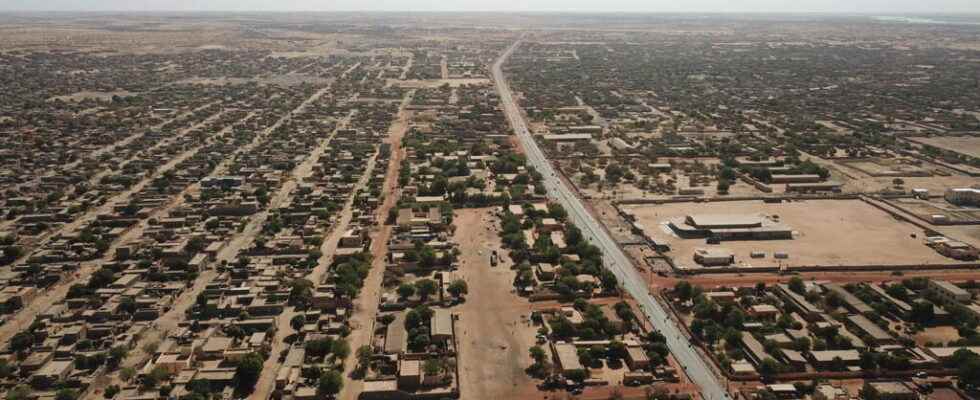In Mali, the armed groups of the North signatories of the peace agreement of 2015 are, this Monday February 20, in Algiers and Amassine. In Algiers for a meeting with the leader of international mediation on the peace agreement, more threatened than ever. And in Amassine, in the Gao region, to launch a vast joint military operation to secure the populations.
380 vehicles and nearly 2,500 men are mobilized: the armed groups of the Permanent Strategic Framework (CSP) which brings together all the signatory groups of the 2015 peace agreement – the former separatist rebels of the CMA like the loyalist groups of the Platform – aim to secure the northern regions themselves, particularly against the Islamic State group which has killed several hundred civilians over the past year, mainly in the Ménaka region.
The signatory groups against the Islamic State group
” We will go wherever the Islamic State commits massacresdetails a CSP framework, to secure civilians and their property, to secure the movements of displaced persons, but also to show that the signatory movements are present and that the Jnim is not an alternative. ” The Jnim, Support Group for Islam and Muslims, linked to al-Qaeda and great rival of the Islamic State Group, has indeed launched, for several weeks, a ” recruitment campaign among the Tuareg populations of the North.
Show of force also addressed to the authorities of Bamako
The various armed groups that signed the 2015 peace agreement have been thinking about this unprecedented pooling of their military forces for several months. Joint operations had already taken place on an ad hoc basis, but never on this scale.
The decision was taken to counter the threat posed by the recurrent attacks of the Islamic State group and to compensate for the lack of involvement of the Malian national army. The FAMA and their Russian auxiliaries, although present in the city of Ménaka, did not take part in any battle against the Islamic State group, despite the multiple calls launched, in particular by the MSA, a signatory group on the front line, to defend civilians in the region.
The joint operation of the CSP is finally launched while relations between the signatory groups and the Malian transitional authorities are more tense than ever. It is difficult, in this context, not to also see a show of force, even a form of warning addressed to the authorities of Bamako. ” These units will be mobilized against any target that may pose an immediate threat Another important executive of the CSP specifies with subtle clarity.
Excessive belligerent declarations
Last week, civil society organizations and personalities, badly masking their links with the authorities of Bamako or with the armed groups of Kidal, engaged in an escalation of hostile and bellicose statements.
Officially, the Malian transitional authorities like the signatory armed groups remain attached to the peace agreement. But the latest developments (blockage of the DDR process on the issue of the military hierarchy in particular, request for an emergency meeting by the CSP on neutral ground, refusal by the Malian government, suspension of the CSP from participation in the monitoring bodies of the ‘agreement…) above all suggest that neither of the two parties wants to take responsibility for its failure: neither for the difficulties of its application for years, nor especially for its death, if it were finally to be recorded.
International mediation
Chance of the calendar – the two events were scheduled and then postponed, each on their side, to finally fall on the same day – the signatory groups of the peace agreement will be, this Monday, in Algiers, for a meeting with the leader international mediation for the follow-up of the peace agreement. Without the other members of the international mediation and without the Malian government.
So it’s not about the ” meeting on neutral ground demanded by the signatory groups for two months, in which the Malian transitional government refuses to participate, but several important leaders of armed groups in the North have been announced. They believe that it is the Malian government that refuses to commit to the implementation of the agreement and want the international mediation to take note of it.
Asked by RFI about this meeting, the Malian Ministry of Reconciliation, in charge of the peace agreement, did not follow up. Three weeks ago, before the UN Security Council, the Malian Minister of Foreign Affairs, Abdoulaye Diop, ” reiterated the Malian government’s commitment ” To ” continue the diligent implementation ” of the peace agreement, judging that he remained ” the essential path for lasting stability in Mali. »
Mohamed el Maouloud Ramadane, spokesperson for the CSP, explains the objectives of this joint operation
Mohamed el Maouloud Ramadane, spokesperson for the CSP, explains the objectives of this joint operation: “ It is to secure the territory, the populations and their property, against any enemy. This is to create tranquility in the different regions where the CSP operates. There will be patrols in the different regions, hundreds of vehicles will be dispatched throughout the territory. »
This operation was initiated in response to the attacks carried out for several months by the Islamic State group ” to bring aid to populations fleeing combat zones. There will also be other objectives, it is the chiefs of staff responsible for carrying out this operation who will discuss them among themselves. There have already been patrols bringing together the different components of the CSP, but in terms of number [d’hommes et de moyens mobilisés, ndlr]she will be the first “, adds Mohamed el Maouloud Ramadane, spokesperson for the CSP.
Mohamed el Maouloud Ramadane, spokesperson for the CSP, explains the objectives of this joint operation
► Read also Mali: failure of the meeting between the CSP and the government in Gao
